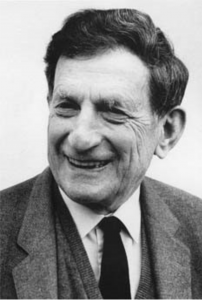I love science, and learning from the scientists who share their knowledge in a way that people like me who lack in technical expertise can appreciate the deeper meaning. Recently I had the pleasure of reading, with participants from the Toronto Philosophy Meetup group, David Bohm’s essays On Dialogue.
 Bohm (1917-1992) was a brilliant scientist whose trailblazing work on the frontier of the quantum mechanics may yet cause a revolution in human thought. Bohm was a proponent of the “pilot wave” interpretation of quantum mechanics, which stands in contrast to the widely-held “Copenhagen interpretation” under which energy exists as both a particle and a wave the act of observation is said to cause the collapse of the wave function. In Bohm’s pilot wave, however, particles of energy entrain to an already-existing wave, thereby changing the sequencing and shape of the wave – but not collapsing it.
Bohm (1917-1992) was a brilliant scientist whose trailblazing work on the frontier of the quantum mechanics may yet cause a revolution in human thought. Bohm was a proponent of the “pilot wave” interpretation of quantum mechanics, which stands in contrast to the widely-held “Copenhagen interpretation” under which energy exists as both a particle and a wave the act of observation is said to cause the collapse of the wave function. In Bohm’s pilot wave, however, particles of energy entrain to an already-existing wave, thereby changing the sequencing and shape of the wave – but not collapsing it.
Which interpretation is correct, if either is? As we learn more about quantum mechanics we may soon find evidence for the truth.
There is much about the operation of the universe at the quantum realm – a quantum being the smallest bit of energy that can cause change or be changed – that we do not understand. And yet we are close to perfecting the quantum computer, which will deliver fantastic speed and accuracy many factors beyond the greatest computers in use today.
In our quest for the power of the universal quantum, we would be wise to heed the words of Bohm, the science-philosopher, in On Dialogue, on the importance of dialogue to human knowledge. We should be careful whose idea of “truth” we decide to follow.
In our universe, in which Heisenberg’s Uncertainty Principle and Godel’s incompleteness theorems reign, we might see the logic in Bohm’s observation: “Science is predicated on the concept that science is arriving at truth – at a unique truth. The idea of dialogue is thereby in some way foreign to the current structure of science, as it with religion. In a way, science has become the religion of the modern age. It plays the role which religion used to play of giving us truth; hence different scientists cannot come together any more than different religions can, once they have different notions of truth. … If scientists could engage in dialogue, that would be a radical revolution in science.”



